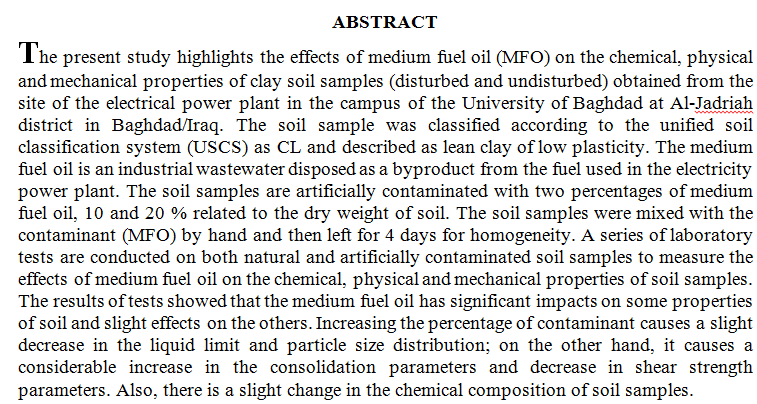
This work represents the set of measurements of radon and thoron concentrations levels of soil-gas in Al-Kufa city in Iraq using electric Radon meter (RAD-7). Radon and thoron concentration were measured in soil-gas in 20 location for three depth of (50, 100 and 150) cm.
The results show that the emanation rate of radon and thoron gas varied from location to anther, depending on the geological formation. The Radon concentration in soil has been found to vary from (12775±400) Bq/m3 at 150 cm depth in location (sample K2) to (41.45±17) Bq/m3, for depth 150 cm in location (sample K20). The thoron concentration in soil has been found to vary from (198±8.5) Bq/m3 at 150 cm depth in location samples (K1 & K2) to undetected in the mos
The functional properties of the defatted powder and protein isolate of germinated mung bean seeds were studied and the estimation of the amino acids was carried out. The results showed a significant increase in the values of the amino acids leucine, lysine, phenylalanine and valine. The results of studying the functional properties of the protein isolate and defatted powder showed that there were significant differences between the sample The defatted and protein isolate, if the water absorption capacity of the defatted mung powder was 2.5% water/gm protein and the water absorption capacity of the protein isolate was 3%ml water/g protein, the fat binding capacity of the defatted powder was 0.3 ml fat/g protein and the isolate The ratio was
... Show MoreObjective This study evaluated the effects of adding titanium oxide (TiO2) nanofillers on the tear strength, tensile strength, elongation percentage, and hardness of room-temperature-vulcanized (RTV) VST50F and high-temperature-vulcanized (HTV) Cosmesil M511 maxillofacial silicone elastomers. Methods Two types of maxillofacial elastomers, VST50F RTV and Cosmesil M511 HTV, were used. Nano-TiO2 powder was applied as a nanofiller. A total of 120 specimens were fabricated, 60 each of VST50F and Cosmesil M511. The specimens of each type of elastomer were divided into three equal groups on which tests were conducted for tear strength, tensile strength, and hardness i.e., 20 specimens were used for each test. Each group of 20 specimens was further
... Show More (31)
(31)
 (13)
(13)
priorities of materials research due to their promising properties, especially in the field of thermoelectricity. The efficiency or performance of thermoelectric devices is expressed in terms of the thermoelectric figure-of-merit (ZT) – a standard indicator of a material’s thermoelectric properties for use in cooling systems. The evaluation of ZT is principally determined by the thermoelectric characteristics of the nanomaterials. In this paper, a set of investigative computations was performed to study the thermoelectric properties of monolayer TMDCs according to the semiclassical treatment of the Boltzmann transport equation. It was confirmed that the thermoelectric properties of 2D materials can be greatly improved compared with thei
... Show More (22)
(22)
 (22)
(22)
in this paper the second order neutral differential equations are incestigated are were we give some new suffucient conditions for all nonoscillatory
A calculation have been carried out for determination some of the spectroscopic properties of Hydrogen Iodide HI molecules such as, the intensity of the absorption spectrum as a function of the variation of the temperature ranging from 10 to 1000 K. This study shows that the populations and hence intensity of the molecule increased as the temperature increased. Another determination of the maximum rotational quantum number Jmax of N2 , CO , BrF AgCl and HI molecules has been carried out.
 (1)
(1)
In this paper , concrete micro-piles were used to improve the bearing capacity of the soil which is supporting the shallow foundation by using groups of (4; 6 and 9)bored short micro-piles which have, (D=0.125m and D=0.1m), and length to diameter ratio (L/D) equal to (6; 10 and 12) respectively. To calculate the bearing capacity of the micro-piles,(Tomlinson) and (Lamda) methods were used; also the soil properties were taken from Al-Muthana airport,(Al-Qyssi,2001) [1]. The results show that; increasing the number of piles and/ or the diameters and lengths; and the interaction between the bearing capacity of the shallow foundation with the bearing capacity of the pile group which leads to increasing the strength against the external loads
... Show MoreExposing the dorsal superficial skin of rats to partial-depth burn leads to bacterial and microbes Invasion. Topical treatment is required in most superficial burn cases Moist exposed burn ointment (MEBO) protects wounds from infection and enhances healing without any harmful effects of purified chemicals is caused. The topical using of HA gel in rat models with full and partial thickness surgical wounds shows enhancement in wound repair. In this study, we compared the healing efficacy of topical use of hyaluronic acid gel products with MEBO as standard management in rats that were exposed to a partial-thickness burn. The experiment included twenty-four (24) adult albino rats of male sex with weight (150-220 gm) of 3 months’ age divided i
... Show More (8)
(8)
 (1)
(1)
